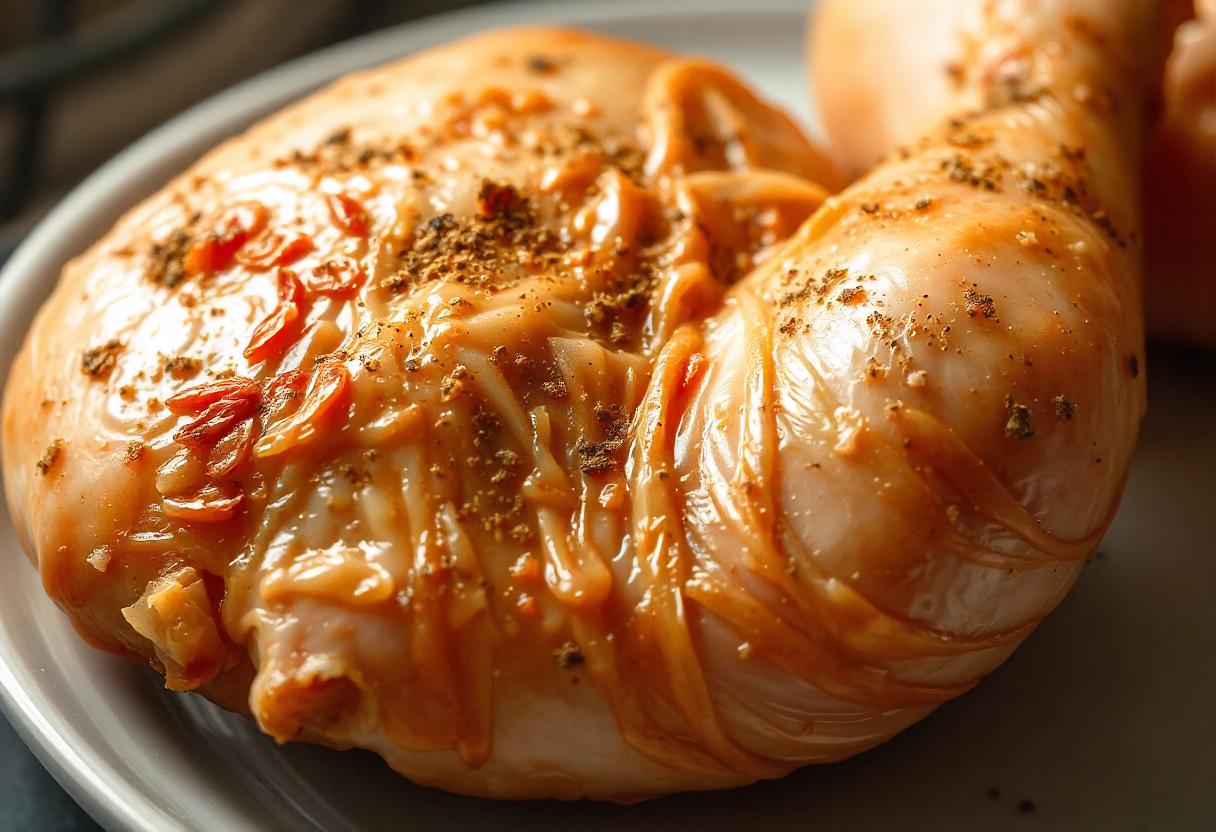How Long Does It Take to Digest Chicken Skin? Chicken skin is a highly popular food ingredient that adds rich flavor and texture to a wide range of dishes. Whether it’s grilled, roasted, or fried, chicken skin is enjoyed by millions worldwide. However, many people are curious about the digestion process of chicken skin, particularly its longer digestion time compared to other parts of the chicken. In this detailed guide, we’ll explore how long it takes to digest chicken skin, the science behind its digestion, the factors that influence the process, and its potential health benefits. We’ll also provide insights on how to enjoy chicken skin in a way that promotes digestive health.
What Makes Chicken Skin So Unique in Digestion?
Chicken skin is not just a flavorful addition to your meal but also has a distinct nutritional and biochemical profile that affects how your body digests it. Let’s break down the primary components that make chicken skin unique in digestion:
1. High Fat Content
The most notable feature of chicken skin is its high fat content. Chicken skin contains both saturated and unsaturated fats, which contribute significantly to its calorie-dense nature. Fats are more complex molecules for the digestive system to break down, which is one of the primary reasons chicken skin takes longer to digest than other leaner parts of chicken. Fat digestion requires bile to emulsify fat droplets, which takes time, particularly with high-fat foods like chicken skin.
2. Collagen and Connective Tissue
Another major component of chicken skin is collagen, a type of protein that provides structural support. Collagen, found abundantly in chicken skin, is difficult to digest. It requires the enzyme pepsin to break it down into its constituent amino acids. Connective tissues, such as elastin, also present a challenge for digestion because they are tougher and more resistant to enzymatic breakdown. The presence of collagen and connective tissues contributes to a slower digestion process.
3. Moisture Content
Chicken skin contains some moisture, but it’s significantly lower compared to other parts of the chicken, like meat or vegetables. This lower moisture content can make chicken skin a bit tougher, requiring more time for your body to process.
How Long Does It Take to Digest Chicken Skin?
The digestive timeline for chicken skin can vary depending on multiple factors. On average, the complete process from ingestion to excretion can take anywhere between 12 to 24 hours. Here’s a breakdown of how chicken skin moves through your digestive system:
1. Mouth and Stomach: Initial Breakdown (2-4 hours)
Digestion begins when you chew and swallow the chicken skin. The mechanical breakdown in the mouth allows your digestive enzymes to start working. However, chicken skin is not significantly broken down by enzymes in the mouth because salivary enzymes primarily target carbohydrates. Once swallowed, the chicken skin travels down the esophagus and reaches the stomach, where gastric juices further break down the proteins like collagen.
While the stomach acids and enzymes like pepsin denature proteins, fats in chicken skin remain largely unaffected at this stage. This means the chicken skin could stay in the stomach for up to 2 to 4 hours, depending on the meal size and your body’s metabolism.
2. Small Intestine: Fat Digestion (4-6 hours)
After leaving the stomach, the chicken skin enters the small intestine, which is where most of the digestion happens. Here, bile from the liver emulsifies fats, breaking them down into smaller droplets. This process allows the pancreas to release enzymes like lipase, which further break down these fat droplets into free fatty acids and glycerol, making them absorbable into the bloodstream.
This step can take 4 to 6 hours, and the efficiency of digestion may vary depending on the presence of other foods in the stomach. If the meal includes high-fiber or high-protein foods, digestion may proceed more smoothly.
3. Large Intestine: Waste Processing (12-24 hours)
Once the fats and proteins are absorbed, the leftover components of the chicken skin, such as collagen remnants and some connective tissue, make their way to the large intestine. The gut microbiota in the colon may ferment some of these fibers and proteins, releasing gases as byproducts, which may contribute to bloating. The remaining waste is then excreted, completing the digestive process within 12 to 24 hours.
Factors That Affect How Long It Takes to Digest Chicken Skin

1. Your Individual Metabolism
The speed of your metabolism plays a major role in how quickly chicken skin is digested. People with a faster metabolism may experience quicker digestion, while those with a slower metabolism may take longer to process chicken skin. Age, physical activity, and overall health also impact metabolism. For instance, younger people tend to have faster metabolisms, which can shorten digestion times.
2. The Composition of Your Meal
The foods you eat alongside chicken skin can also affect digestion times. High-fiber foods, such as vegetables, whole grains, and legumes, can help speed up digestion by promoting bowel motility. However, fatty or greasy foods may slow digestion, as they require more time for fat emulsification and absorption.
3. Cooking Method
How chicken skin is prepared also influences its digestibility:
- Fried chicken skin contains added oils and fats, which may take longer to break down.
- Grilled chicken skin retains most of its fat content but is still easier to digest compared to deep-fried.
- Steamed or boiled chicken skin tends to have a softer texture and fewer added fats, making it easier for the body to process.
4. Digestive Health
Your digestive system’s health can greatly impact how well you process chicken skin. Conditions like gallstones, irritable bowel syndrome (IBS), or pancreatitis can impair fat digestion and slow down the process. Those with compromised digestion may experience discomfort or slower processing times when consuming high-fat foods like chicken skin.
Health Benefits and Drawbacks of Eating Chicken Skin
Chicken skin is often vilified for its high-fat content, but it also offers a variety of potential health benefits when consumed in moderation.
Health Benefits:
- Rich in Healthy Fats
Chicken skin contains both monounsaturated and polyunsaturated fats, which are known to benefit heart health when consumed in appropriate amounts. These fats can help raise HDL (good) cholesterol levels and improve overall cardiovascular health. - Collagen for Skin and Joint Health
Chicken skin is an excellent source of collagen, a protein that supports skin elasticity, joint health, and connective tissue strength. Consuming collagen-rich foods may help improve skin appearance and support joint mobility. - Satiety and Energy
The high-fat content in chicken skin provides a substantial amount of calories, which can be beneficial for individuals who need extra energy, such as athletes or those looking to gain weight. The fats also help keep you feeling full longer, reducing overall hunger and preventing overeating.
Drawbacks:
- High in Calories
Because of its high fat content, chicken skin is calorie-dense. Overeating chicken skin regularly can contribute to excessive calorie intake, which may lead to weight gain if not balanced with physical activity. - Saturated Fat Content
While some fats are healthy, saturated fats found in chicken skin may increase LDL (bad) cholesterol levels when consumed excessively. This can raise the risk of heart disease, especially in individuals with existing cardiovascular conditions.
How to Incorporate Chicken Skin into a Healthy Diet

Although chicken skin can be part of a healthy diet, moderation is key. Here are some tips on how to enjoy chicken skin without compromising your health:
1. Control Portions
Instead of consuming large amounts of chicken skin, opt for smaller portions that add flavor without going overboard on fat and calories. A small piece of crispy chicken skin on top of a vegetable-based salad can be a great addition.
2. Cook with Healthy Methods
Opt for cooking methods that reduce unnecessary fats. Grilling, baking, or steaming chicken skin ensures that most of the excess fat is removed, making it a more digestible and healthier option.
3. Pair with Fiber-Rich Foods
Combine chicken skin with high-fiber foods like leafy greens, broccoli, or quinoa to enhance digestion and maintain a balanced nutrient profile. The fiber from vegetables aids in faster digestion and supports gut health.
4. Limit Frequency
Incorporate chicken skin into your meals occasionally rather than regularly. Moderation will help you enjoy its flavor while avoiding excessive fat intake.
Digesting Chicken Skin in 5 Key Steps
- Step 1: Chew and swallow.
- Step 2: Gastric juices break down proteins.
- Step 3: Bile emulsifies fats in the small intestine.
- Step 4: Absorption of fatty acids and glycerol.
- Step 5: Excretion of undigested components.
How Long Does Chicken Skin Take to Digest?
- On average, 10 to 24 hours. The full digestion process depends on factors like metabolism, meal composition, and individual digestive health.
Is Chicken Skin Healthy?
- In moderation, chicken skin provides essential healthy fats, collagen, and energy. However, excessive consumption may contribute to weight gain due to its high calorie content.
Conclusion: Balancing Enjoyment and Digestion with Chicken Skin
While chicken skin is often considered a guilty pleasure, it can be enjoyed healthily and digested effectively if consumed in moderation. Understanding the digestive process, coupled with practical tips on cooking methods, portion control, and meal composition, can help you enjoy the benefits of chicken skin while minimizing its drawbacks. Whether you’re a fan of crispy skin or prefer it in a stew, chicken skin can add flavor and texture to your meals without compromising your digestive health.
FAQs About How Long Does It Take to Digest Chicken Skin?

1. How long does it take to digest chicken skin?
The digestion of chicken skin can take between 12 to 24 hours, depending on several factors, such as your metabolism, the overall composition of the meal, and the health of your digestive system. After chewing and swallowing, chicken skin spends about 2 to 4 hours in the stomach before moving to the small intestine, where fats are emulsified and absorbed over the course of 4 to 6 hours. The remaining components then travel to the large intestine for further processing.
2. Is chicken skin difficult to digest?
Chicken skin can be more challenging to digest than lean chicken meat due to its high fat content and the presence of collagen and connective tissue. These elements require specific enzymes to break down, making the digestion process slower compared to leaner cuts of chicken.
3. Can chicken skin cause digestive issues?
For most people, chicken skin does not cause digestive issues when consumed in moderation. However, individuals with conditions like gallstones, irritable bowel syndrome (IBS), or pancreatitis may experience discomfort or slower digestion. It’s important to listen to your body and adjust your intake accordingly.
4. Is it healthier to remove chicken skin before cooking?
Removing chicken skin can lower the fat content of your meal, especially if you are watching your calorie or fat intake. However, if you cook chicken without the skin but use added fats (like butter or oil), you may not see a significant reduction in fat content. It’s more important to choose cooking methods that do not rely heavily on additional fats, such as grilling or baking.
5. What are the health benefits of eating chicken skin?
Chicken skin is rich in healthy fats, particularly monounsaturated and polyunsaturated fats, which can promote heart health when eaten in moderation. It also provides collagen, which is beneficial for joint health and improving skin elasticity. The fats in chicken skin help increase feelings of satiety, potentially preventing overeating.
6. Does chicken skin cause weight gain?
Chicken skin is calorie-dense due to its high fat content. Eating large amounts of chicken skin without balancing it with other nutrient-rich foods could lead to an increase in overall calorie intake, which may contribute to weight gain over time. Moderation is key to enjoying chicken skin without negatively impacting your weight.
7. Can chicken skin be part of a healthy diet?
Yes, chicken skin can be part of a healthy diet when consumed in moderation. To keep your diet balanced, it’s important to pair chicken skin with fiber-rich vegetables and whole grains and use healthier cooking methods like grilling or baking instead of deep-frying.
8. How can I make chicken skin easier to digest?
To make chicken skin easier to digest, consider using gentle cooking methods like steaming, grilling, or baking, which help render excess fat and soften the skin. Additionally, pairing chicken skin with high-fiber foods, such as leafy greens and whole grains, can help your body process the fat more efficiently.
9. Is eating chicken skin bad for heart health?
While chicken skin does contain saturated fats, it also includes unsaturated fats, which are beneficial for heart health. If consumed in moderation, chicken skin can be part of a balanced diet without significantly affecting heart health. However, excessive consumption of saturated fats can raise LDL cholesterol levels, so it’s best to eat chicken skin sparingly, especially if you have a history of cardiovascular issues.
10. How should I store chicken skin if I want to keep it for later?
If you have leftover chicken skin, it’s best to store it in an airtight container in the refrigerator for up to 3 days. If you want to keep it longer, you can freeze the chicken skin in portioned bags or containers. When you’re ready to use it, thaw it in the refrigerator before reheating it for your next meal.

Daniel, a seasoned author with 8 years of expertise in SEO, brings a delectable blend of culinary flair and digital finesse to the food niche on his website.



